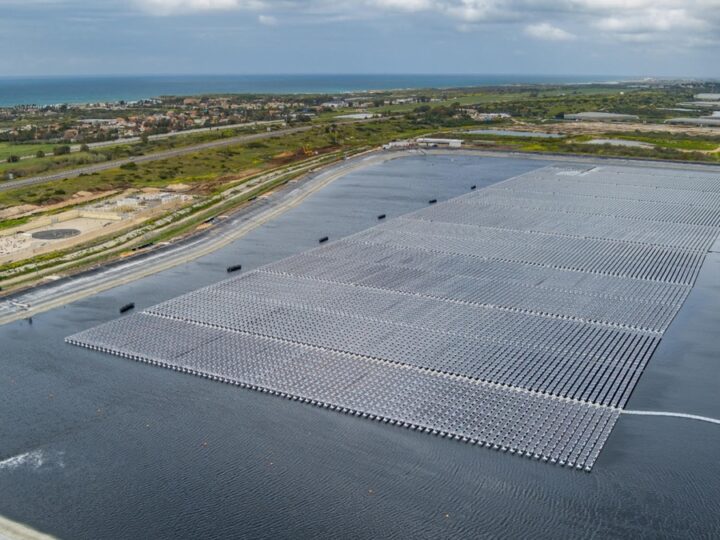The roof of a sprawling Amazon logistics center in France will soon be blanketed with 5,000 square meters of lightweight, flexible solar panels from the Israeli company Apollo Power. Outside, a unique solar pavement by Apollo is already generating clean electricity to charge employees’ electric bikes and scooters.
Volkswagen Group placed a 33 million euro order with Apollo for 10 years’ worth of the flexible film to charge their new electric vans with sunshine.
“I have it on my own roof, and I think everyone will do this in the future,” says Apollo CEO and cofounder Oded Rozenburg. “Why put 2,000 kilograms on your roof when you can put only 350 kilograms on your roof?”
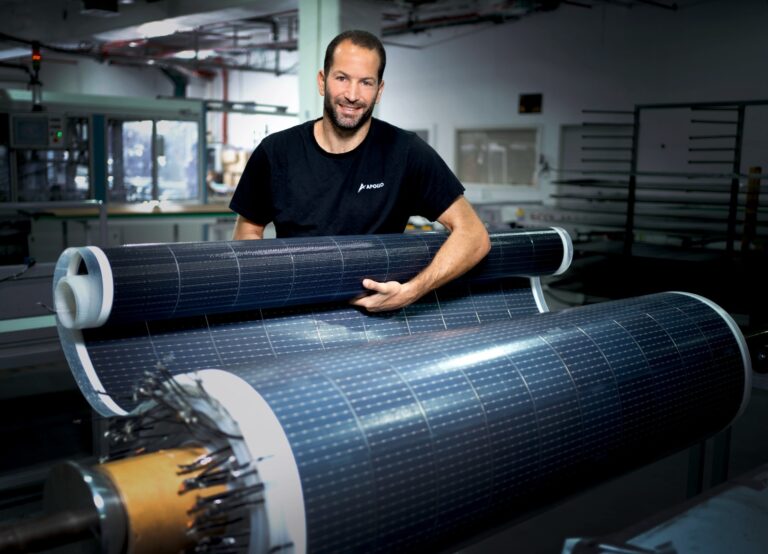
That simple equation convinced Rozenburg to join forces with Eran Maimon in 2013.
Maimon, an expert in solar energy, physics and mechanical engineering, had invented a photovoltaic paint during his studies at Tel Aviv University that eliminates the need to envelop silicon wafers in glass.
World-changing
“The problem is that the basic technology of solar cells is very thin silicon wafers. Silicon wafers are super fragile so you need to coat them with glass and the panels become heavy, expensive and limited to places that can hold the weight,” explains Rozenburg.
“The idea of flexible, lightweight panels collecting energy from the sun for free, I thought, is something that can change the world.”
It took several years to raise money and perfect the invention at the Technion-Israel Institute of Technology. In 2020, Apollo opened a small factory in Yokne’am and started to sell its solar film.
Today, with many customers and strategic partners under its belt, Apollo Power has built the biggest flexible solar panel factory in the world, in Israel’s Carmel region.
The fully automated 11,000-square-meter factory positions Apollo to serve the global market, now that the panels have received both UL (North America) and IEC (International Electrotechnical Commission) certification enabling them to connect to the electrical grid in many countries.
Cars that can charge from the sun
The VW deal is one of many for Apollo in the automotive space. Because the panels stand up to extreme weather and vehicle vibrations, they can provide continuous unplugged charging.
“I think this is the future of cars, to charge themselves from the sun while driving, in traffic and while parked,” says Rozenburg, who previously was deputy CEO of one of Israeli billionaire industrialist Stef Wertheimer’s companies.
Apollo has been working with Hyundai for two and a half years on a project to integrate its panels into the hood of the Ioniq 5 electric car.
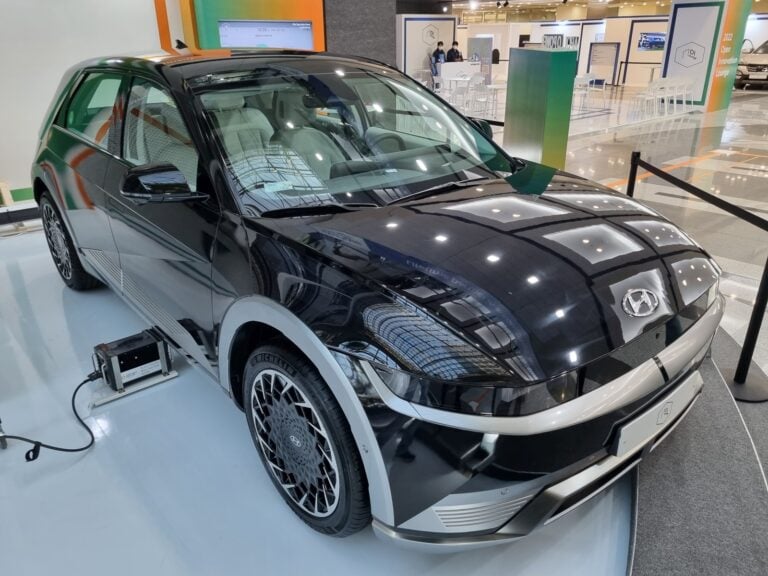
Apollo and Audi won a JEC Innovation Award in 2022 for the solar electric car roof they’ve developed jointly.
The company’s solar roll and solar car roof also were finalists in Intersolar Europe 2023, the leading solar exhibition in the world.
Apollo has sold thousands of its after-market products to fleets of buses and trucks in Israel, Germany, the US, Belgium, Poland and Turkey, Rozenburg says.
Israel’s largest food brands, including Osem, Strauss, Supersal and Unilever, all have Apollo panels on top of their delivery trucks.
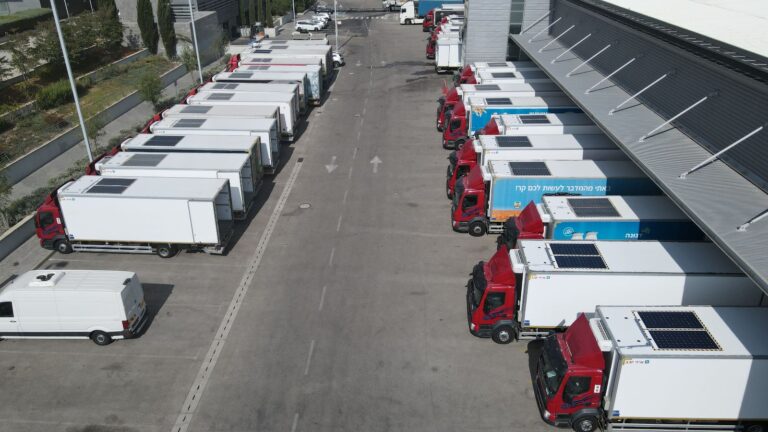
“We laminate our solar panel to the roof of the vehicle — it can be electric or diesel — to maintain the battery and save money on fuel. Our vision is to make roofs of vehicles into solar energy fields.”
Tests by Apollo have shown a fuel savings of 5-8%. Installing a solar panel on a single truck potentially reduces CO2 emissions by about four tons annually while significantly reducing urban noise pollution.
Up on the roof
Rozenburg tells ISRAEL21c that Apollo’s biggest market is roofs that have load limits and cannot support standard glass solar panels, like some 30 percent of industrial facilities including Amazon warehouses.
Apollo panels also are light enough to put on the plastic roofs of agricultural greenhouses and net houses. Through a distribution agreement with Tadiran Solar, Apollo has been working with an Israeli flower greenhouse for the past two years.
Growing crops under solar panels (agrivoltaics) enables using the same plot of land to produce food and sustainable energy. Agrivoltaics installed on just 1% of arable land could fill global electricity needs.
In addition to various sizes of solar panel rolls and mats, Apollo also makes solar pavements and floating solar panels for reservoirs. A project to develop solar awnings with Lippert Components of Elkhart, Indiana, recently received a grant from the Binational Industrial Research and Development (BIRD) Energy program.
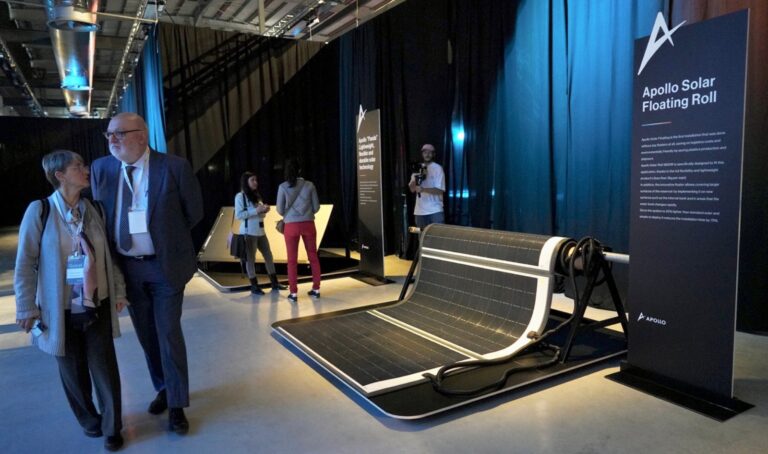
“We’ve sold around 20 million shekels of our products until now from our small factory. The new Apollo Carmel factory will have the capacity to sell 350 million shekels worth of products per year,” says Rozenburg.
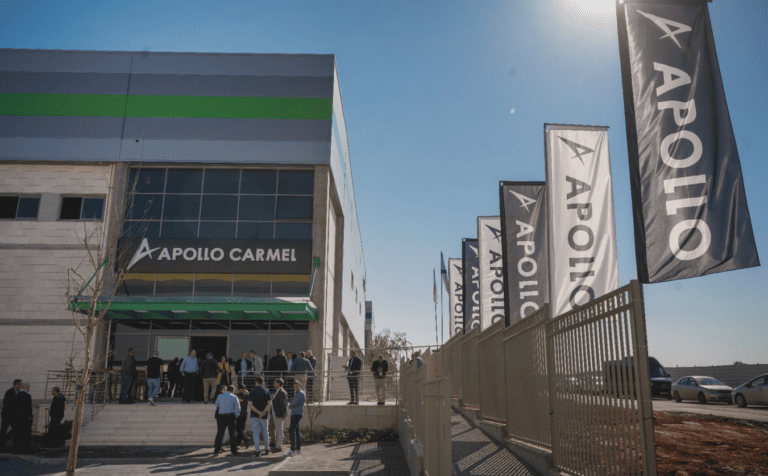
Recently, the company delivered 2,000 units to the Israeli military to charge soldiers’ phones and drones in combat zones. Each 2-square-meter panel can charge seven phones.
Durability is one factor that sets apart Apollo from flexible solar panels made by a handful of small competitors, he says.
“We guarantee 25 years of performance, as durable as glass. And our cell reaches 17.5% efficiency, very close to glass panels, while our competitors’ cells are getting 5-10% efficiency. Also our panels are competitively priced with glass panels,” Rozenburg explains, “so they can be put anywhere the sun shines.”
For more information, click here.















